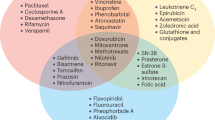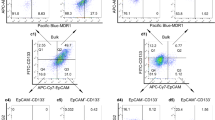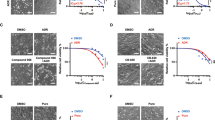Abstract
The phenomenon of multidrug resistance (MDR) in human cancers is one of the major causes of failure of chemotherapy. A recently identified new member of the superfamily of ATP-binding cassette transporters, breast cancer resistance protein (BCRP), was demonstrated to confer an atypical multidrug-resistant phenotype to tumor cells. To overcome the BCRP-mediated drug resistance, a specific anti-BCRP hammerhead ribozyme was introduced into the human gastric carcinoma cell line, EPG85-257RNOV, exhibiting an atypical MDR phenotype. By this approach, the expression levels of the targeted BCRP-encoding mRNA and the BCRP transport protein were decreased to the low constitutive expression level that was observed in highly drug-sensitive parental gastric carcinoma cells. In addition, in the anti-BCRP ribozyme-treated cells, the cellular drug accumulation was dramatically increased to the level measured in drug-sensitive cells. These effects were accompanied by an extensive reversal of the drug-resistant phenotype of more than 80%. Because additional mechanisms contribute to the multimodal-mediated MDR phenotype exhibited by this gastric carcinoma cell line, the data suggest that the BCRP-mediated contingent to the drug resistance was overcome nearly completely. Moreover, the data indicate that ribozyme-based gene therapy may be clinically applicable in preventing and reversing BCRP-mediated atypical MDR.
This is a preview of subscription content, access via your institution
Access options
Subscribe to this journal
Receive 12 print issues and online access
$259.00 per year
only $21.58 per issue
Buy this article
- Purchase on Springer Link
- Instant access to full article PDF
Prices may be subject to local taxes which are calculated during checkout





Similar content being viewed by others
References
Gottesman MM, Fojo T, Bates SE . Multidrug resistance in cancer: role of ATP-dependent transporters Nat Rev Cancer 2002 2: 48–58
Borst P, Evers R, Kool M, Wijnholds J . A family of drug transporters: the multidrug resistance–associated proteins J Natl Cancer Inst 2000 92: 1295–1302
Lage H, Dietel M . Effect of the breast cancer resistance protein on atypical multidrug resistance Lancet Oncol 2000 1: 169–175
Ross DD, Yang W, Abruzzo LV et al. Atypical multidrug resistance: breast cancer resistance protein messenger RNA expression in mitoxantrone-selected cell lines J Natl Cancer Inst 1999 91: 429–433
Doyle LA, Yang W, Abruzzo LV et al. A multidrug resistance transporter from human MCF-7 breast cancer cells Proc Natl Acad Sci USA 1998 95: 15665–15670
Volm M . Multidrug resistance and its reversal Anticancer Res 1998 18: 2905–2918
Rabindran SK, Ross DD, Doyle LA, Yang W, Greenberger LM . Fumitremorgin C reverses multidrug resistance in cells transfected with the breast cancer resistance protein Cancer Res 2000 60: 47–50
van Loevezijn A, Allen JD, Schinkel AH, Koomen GJ . Inhibition of BCRP-mediated drug efflux by fumitremorgin-type indolyl diketopiperazines Bioorg Med Chem Lett 2001 11: 29–32
de Bruin M, Miyake K, Litman T, Robey R, Bates SE . Reversal of resistance by GF120918 in cell lines expressing the ABC half-transporter, MXR Cancer Lett 1999 146: 117–126
Erlichman C, Boerner SA, Hallgren CG et al. The HER tyrosine kinase inhibitor CI1033 enhances cytotoxicity of 7-ethyl-10-hydroxycamptothecin and topotecan by inhibiting breast cancer resistance protein-mediated drug efflux Cancer Res 2001 61: 739–748
Maliepaard M, van Gastelen MA, Tohgo A et al. Circumvention of breast cancer resistance protein (BCRP)–mediated resistance to camptothecins in vitro using non-substrate drugs or the BCRP inhibitor GF120918 Clin Cancer Res 2001 7: 935–941
Perego P, De Cesare M, De Isabella P et al. A novel 7–modified camptothecin analog overcomes breast cancer resistance protein-associated resistance in a mitoxantrone-selected colon carcinoma cell line Cancer Res 2001 61: 6034–6037
Kobayashi H, Dorai T, Holland JF, Ohnuma T . Reversal of drug sensitivity in multidrug-resistant tumor cells by an MDR1(PGY1) ribozyme Cancer Res 1994 54: 1271–1275
Holm PS, Scanlon KJ, Dietel M . Reversion of multidrug resistance in the P-glycoprotein–positive human pancreatic cell line (EPP85-181RDB) by introduction of a hammerhead ribozyme Br J Cancer 1994 70: 239–243
Kitazono M, Sumizawa T, Takebayashi Y et al. Multidrug resistance and the lung resistance–related protein in human colon carcinoma SW-620 cells J Natl Cancer Inst 1999 91: 1647–1653
Stuart DD, Kao GY, Allen TM . A novel, long-circulating, and functional liposomal formulation of antisense oligodeoxynucleotides targeted against MDR1 Cancer Gene Ther 2000 7: 466–475
Marthinet E, Divita G, Bernaud J, Rigal D, Baggetto LG . Modulation of the typical multidrug resistance phenotype by targeting the MED-1 region of human MDR1 promoter Gene Ther 2000 7: 1224–1233
Ruffner DE, Stormo GD, Uhlenbeck OC . Sequence requirements of the hammerhead RNA self-cleavage reaction Biochemistry 1990 29: 10695–10702
Kawabata S, Oka M, Shiozawa K et al. Breast cancer resistance protein directly confers SN-38 resistance of lung cancer cells Biochem Biophys Res Commun 2001 280: 1216–1223
Kowalski P, Wichert A, Holm PS, Dietel M, Lage H . Selection and characterization of a high activity ribozyme directed against the antineoplastic drug resistance–associated ABC-transporter BCRP/MXR/ABCG2 Cancer Gene Ther 2001 8: 185–192
Dietel M, Arps H, Lage H, Niendorf A . Membrane vesicle formation due to acquired mitoxantrone resistance in human gastric carcinoma cell line EPG85-257 Cancer Res 1990 50: 6100–6106
Lage H, Helmbach H, Grottke C, Dietel M, Schadendorf D . DFNA5 (ICERE-1) contributes to acquired etoposide resistance in melanoma cells FEBS Lett 2001 494: 54–59
Stein U, Walther W, Laurencot CM, Scheffer GL, Scheper RJ, Shoemaker RH . Tumor necrosis factor-alpha and expression of the multidrug resistance–associated genes LRP and MRP J Natl Cancer Inst 1997 89: 807–813
Maliepaard M, Scheffer GL, Faneyte IF et al. Subcellular localization and distribution of the breast cancer resistance protein transporter in normal human tissues Cancer Res 2001 61: 3458–3464
Scheffer GL, Maliepaard M, Pijnenborg AC et al. Breast cancer resistance protein is localized at the plasma membrane in mitoxantrone- and topotecan-resistant cell lines Cancer Res 2000 60: 2589–2593
Skehan P, Storeng R, Scudiero D et al. New colorimetric cytotoxicity assay for anticancer-drug screening J Natl Cancer Inst 1990 82: 1107–1112
Allen JD, Brinkhuis RF, Wijnholds J, Schinkel AH . The mouse Bcrp1/Mxr/Abcp gene: amplification and overexpression in cell lines selected for resistance to topotecan, mitoxantrone, or doxorubicin Cancer Res 1999 59: 4237–4241
Lage H, Perlitz C, Abele R et al. Enhanced expression of human ABC-transporter TAP is associated with cellular resistance to mitoxantrone FEBS Lett 2001 503: 179–184
Saxena SK, Ackerman EJ . Ribozymes correctly cleave a model substrate and endogenous RNA in vivo J Biol Chem 1990 265: 17106–17109
Thierry AR, Rahman A, Dritschilo A . Overcoming multidrug resistance in human tumor cells using free and liposomally encapsulated antisense oligodeoxynucleotides Biochem Biophys Res Commun 1993 190: 952–960
Wichert A, Holm PS, Dietel M, Lage H . Selection of a high activity ribozyme against the cytostatic drug resistance associated glypican-3 using an in vitro assay containing total tumor RNA Cancer Gene Ther 1999 6: 263–270
Materna V, Holm PS, Dietel M, Lage H . Kinetic characterization of ribozymes directed against the cisplatin resistance-associated ABC-transporter cMOAT/MRP2/ABCC3 Cancer Gene Ther 2001 8: 176–184
Kellner U, Hutchinson L, Seidel A et al. Decreased drug accumulation in a mitoxantrone-resistant gastric carcinoma cell line in the absence of P-glycoprotein Int J Cancer 1997 71: 817–824
Lage H, Dietel M . Involvement of the DNA mismatch repair system in antineoplastic dug resistance J Cancer Res Clin Oncol 1999 125: 156–165
Zhou S, Schuetz JD, Bunting KD et al. The ABC transporter Bcrp1/ABCG2 is expressed in a wide variety of stem cells and is a molecular determinant of the side-population phenotype Nat Med 2001 7: 1028–1034
Hertel KJ, Pardi A, Uhlenbeck OC et al. Numbering system for the hammerhead Nucleic Acids Res 1992 20: 3252
Acknowledgements
This work was supported in part by grants of the “NOVARTIS Stiftung für therapeutische Forschung”, the “Deutsche Forschungsgemeinschaft” (LA 1039/2-1) and the “Deutsche Krebshilfe” (10-1313-La3). We are grateful to RJ Scheper (Free University Amsterdam, the Netherlands) for providing the BCRP-specific mAbs BXP-21 and BXP-34.
Author information
Authors and Affiliations
Corresponding author
Rights and permissions
About this article
Cite this article
Kowalski, P., Stein, U., Scheffer, G. et al. Modulation of the atypical multidrug-resistant phenotype by a hammerhead ribozyme directed against the ABC transporter BCRP/MXR/ABCG2. Cancer Gene Ther 9, 579–586 (2002). https://doi.org/10.1038/sj.cgt.7700471
Received:
Published:
Issue Date:
DOI: https://doi.org/10.1038/sj.cgt.7700471
Keywords
This article is cited by
-
The emerging pharmacotherapeutic significance of the breast cancer resistance protein (ABCG2)
British Journal of Pharmacology (2007)
-
The roles of four multi-drug resistance proteins in hepatocellular carcinoma multidrug resistance
Journal of Huazhong University of Science and Technology (2007)
-
Glypican-3 is involved in cellular protection against mitoxantrone in gastric carcinoma cells
Oncogene (2004)
-
Multidrug resistance mediated by the breast cancer resistance protein BCRP (ABCG2)
Oncogene (2003)
-
Strategies for reversing drug resistance
Oncogene (2003)



